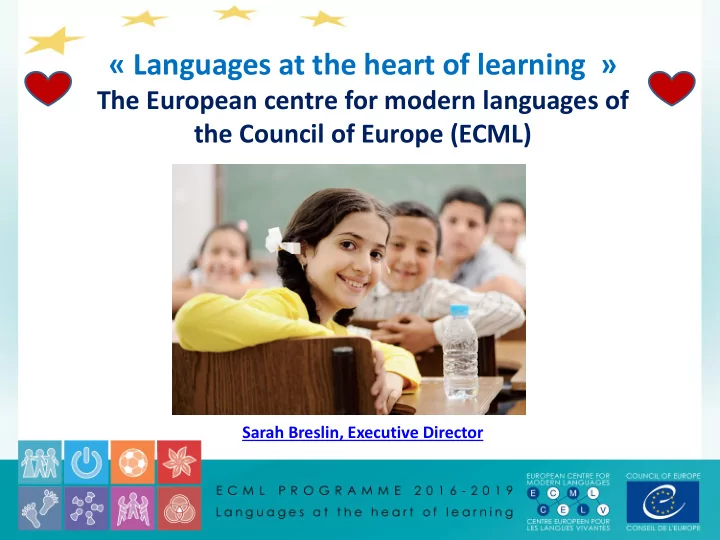

« Languages at the heart of learning » The European centre for modern languages of the Council of Europe (ECML) Sarah Breslin, Executive Director
The Council of Europe and languages Curricula and evaluation http://www.coe.int/t/dg4/linguistic/langeduc/le_platformintro_EN.asp 2
Current priorities in ECML member states 3
ECML: who we are and what we do An enlarged Partial Agreement Mission of the Council of Europe with 33 innovation in language learning and member states; founded in Graz, teaching; implementation of effective Austria in 1994 language education policies 4 year programmes Key target audience decision-makers, teacher-trainers, of international projects and language teachers bilateral training and consultancy Our vision A Europe committed to linguistic and cultural diversity, where the key role of quality language education in achieving intercultural dialogue, democratic citizenship and social cohesion is recognised and supported. 4
ECML Programme 2016-19 “Languages at the heart of learning” Development Projects Think tanks Support in Activities for a national wider public contexts Mediation
ECML training and consultancy for member states Targeted, tailored support to address national challenges Supporting Multilingual Classrooms* Language teacher education Plurilingual education Content and Language Integrated Learning Testing and Assessment (RELANG)* Use of ICT in support of language teaching Quality education in Romani and learning Quality assurance in language and Plurilingual and intercultural learning citizenship courses through mobility Using the European Language Portfolio * in cooperation with the European Commission
7
PEPELINO: European portfolio for pre-primary educators
Parents and teachers: working together for plurilingual and intercultural education http://parents.ecml.at/
Collaborative community approach to migrant education • Creating an inclusive learning environment • Identifying issues and ways forward • Challenging our own attitudes • Opening the classroom to the community • Working together towards literacy • Making space for learners ’ languages • Creating multilingual resources
The language of schooling: support from the Language Policy Unit • Language dimension in subjects • Policy initiatives to promote quality and equity • View of language • Subject issues • Teacher development http://www.coe.int/t/dg4/Linguistic/Source/LE_texts_Source/LE%202015/Handbook-at-a-glanceA5_EN.pdf
A pluriliteracies approach to teaching for learning : moving beyond traditional CLIL “ Deeper learning is the ability to take what was learned in one situation and apply it to another situation. Through deeper learning (which often involves shared learning and interactions with others in a community), our students develop expertise in a particular subject and they master the unique ways of the subject.” (Pellegrino & Hilton 2012)
From theory to practice Understanding the concept: material phase Communicating the concept: verbal phase Using the concept in different contexts: cognitive phase
Language skills for successful subject learning: CEFR-linked descriptors for mathematics and history Suggestions for use: • For raising awareness of the language-related aspects and the importance of language in constructing knowledge in non-language subjects • For setting language objectives in lessons • For use as assessment criteria (formative and summative) • For gauging the language level used by teachers in subject clases and adapting it accordingly “Whatever the subject, all knowledge building in the school context involves working with language.”(
Towards whole-school language curricula Different types of projects : • as part of everyday school life • as an integral part of the curriculum • as optional subjects • as specific cooperation between 2/3 languages – having a common grammar • as an interdisciplinary module Eight detailed case-studies from Austria, Germany, France and Italy
FREPA components http://carap.ecml.at/
ECML: a unique centre for language education Addressing national needs through Training and Consultancy Building networks Encouraging language and partnerships learning through the within and beyond European Day of Europe Languages ECML key services Providing practical resources for Future-proofing through language innovative projects professionals
« Knowledge of languages is the doorway to wisdom » Roger Bacon
Recommend
More recommend